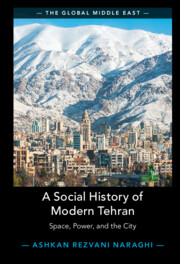Book contents
- A Social History of Modern Tehran
- The Global Middle East
- A Social History of Modern Tehran
- Copyright page
- Dedication
- Contents
- Figures
- Tables
- Foreword
- Preface
- Introduction
- 1 Segmented Society and the Social Production of Communal Spaces
- 2 Segmented Society and Spaces of Political Mobilization
- 3 Iranian Travelers and the Production of Spatial Knowledge
- 4 The Qajar Court and the City
- 5 The Interwar Period and Middle-Class Urbanism
- 6 The Age of Social Movements
- Conclusion
- Appendix Protest, Political Gatherings, and Parades between 1941 and 1953
- Bibliography
- Index
3 - Iranian Travelers and the Production of Spatial Knowledge
Published online by Cambridge University Press: 22 December 2022
- A Social History of Modern Tehran
- The Global Middle East
- A Social History of Modern Tehran
- Copyright page
- Dedication
- Contents
- Figures
- Tables
- Foreword
- Preface
- Introduction
- 1 Segmented Society and the Social Production of Communal Spaces
- 2 Segmented Society and Spaces of Political Mobilization
- 3 Iranian Travelers and the Production of Spatial Knowledge
- 4 The Qajar Court and the City
- 5 The Interwar Period and Middle-Class Urbanism
- 6 The Age of Social Movements
- Conclusion
- Appendix Protest, Political Gatherings, and Parades between 1941 and 1953
- Bibliography
- Index
Summary
From the late eighteenth century, various sections of Iranian society, particularly the court and the elites, developed an acquaintance with European and American cities, their social lives, and spaces through direct visits, postcards, geographical texts, pictures, and other means of knowledge transfer. The analysis of Iranians’ wonder-like appreciations of Western cities helps to illustrate how this novel spatial knowledge determined the future of Iranian cities. This chapter suggests that the post-1870s spatial transformations of Tehran had been incubated in Iranian society – at least among the elites and the Qajar court – for decades. I argue that these transformations were the outcome of the gradual formation and development of a spatial discourse, rather than an abrupt change and a sudden disjuncture from the past. By adopting the Foucauldian conception of discourse, this chapter focuses on Iranians’ acquaintance with European cities, their social lives, and social spaces. The exposure to new ideas was not limited to the political landscape and had an impact on various aspects of Iranian society. In the nineteenth and twentieth centuries, the growing relationship between Iran and European countries generated new forms of knowledge and transferred them to Iranian society. From culinary culture to the establishment of a new educational system, and from painting and theater to industrial and monetary organizations, various aspects of this impact have been investigated before.
- Type
- Chapter
- Information
- A Social History of Modern TehranSpace, Power, and the City, pp. 135 - 173Publisher: Cambridge University PressPrint publication year: 2023



